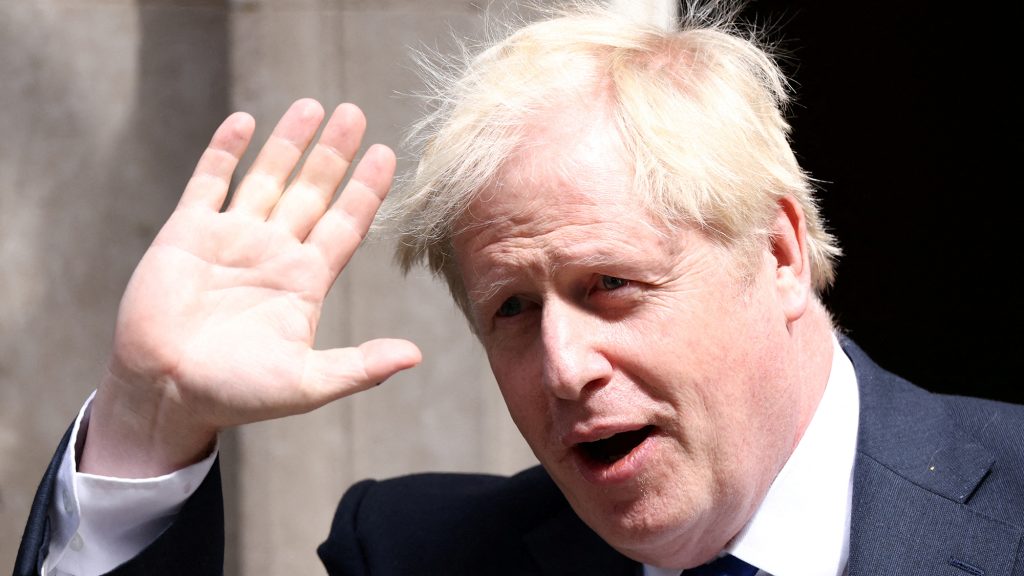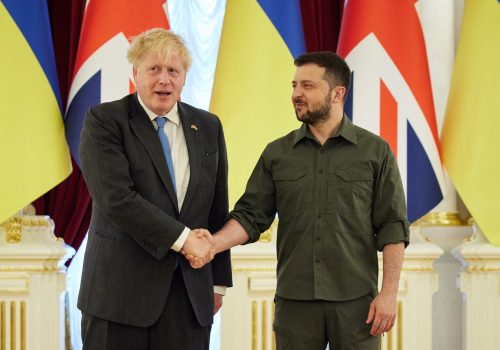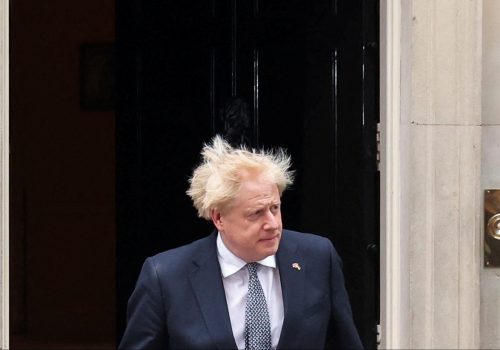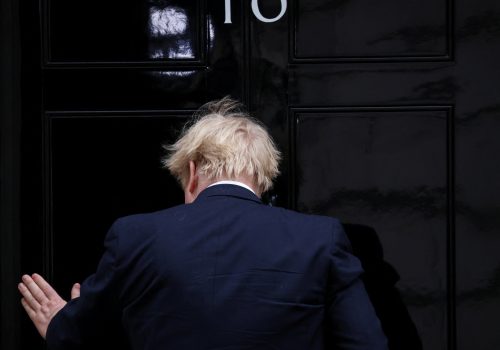Boris Johnson announced on Thursday that he would leave his post as prime minister of the United Kingdom as soon as a replacement from within the Conservative Party is selected, after a series of scandals resulted in a revolt from within his administration. So what happens now to the “Global Britain” that Johnson was trying to build? We reached out to our experts to gauge the reaction in foreign capitals to the drama in Westminster, and what the future might hold for the United Kingdom.
Jump to an expert reaction
Ben Judah: A monument to failure
Peter Westmacott: What will (and won’t) change about UK foreign policy
Frances Burwell: “Sighs of relief” in Brussels, but could relations get worse?
Peter Dickinson: What Johnson’s departure means for Ukraine
A monument to failure
Boris Johnson once remarked he went into politics because nobody ever built a statue to a journalist. The truth is that nobody in Britain is ever going to build a statue of Boris Johnson, except perhaps in mockery.
He will leave two monuments in British political history: not only an increasingly failing Brexit but also a warning to future prime ministers of how you can personally fritter away an eighty-seat majority. Johnson tried to rule presidentially, even royally—in his desperation talking of his personal mandate—only to underscore that Westminster remains a parliamentary system, in which leaders serve at the pleasure of their MPs.
It may not be a plinth outside Parliament, but despite everything Boris Johnson will leave office with a street named after him in Ukraine. His decision to be “way out in front” of all Western allies on defending Ukraine, from anti-tank weapons to sanctions, made a critical difference in the nation’s defense in the eyes of Ukraine’s most senior officials who, pretty much alone, tweeted their respect and gratitude for his achievements.
A lot of what Johnson did was empower a tough-minded network of foreign-policy advisors and security officials to put Ukraine first. The British senior civil service is not politically appointed so much of this network will stay in place. London without Johnson will not drop Kyiv.
Like on Brexit, he leaves a legacy that his successors simply can’t overturn—the cross-party consensus is deep on backing Ukrainian President Volodymyr Zelenskyy—but again like on Brexit, the question is with what fervor will it be pursued. The next prime minister is unlikely to have Johnson’s appetite for risk, especially on sanctions, as the ailing British economy gets sicker.
—Ben Judah is a senior fellow at the Europe Center.
What will (and won’t) change about UK foreign policy
Boris Johnson finally, and reluctantly, bowed to the inevitable. In refusing to go on Wednesday night, when dozens of his ministers had resigned and members of his cabinet were urging him to go, he argued—wrongly, since the United Kingdom has a parliamentary democracy—that he had a personal mandate from the British people to stay on as a result of the Conservative Party’s electoral victory at the end of 2019. His colleagues persuaded him that this was not the case.
In his resignation speech outside 10 Downing Street, Johnson nevertheless said that he would remain in office until the party had chosen his successor. That could take months, since there are many candidates for his job and processes to be completed. Bizarrely, in the hours before he said he was resigning, Johnson appointed a number of ministers to fill the vacancies left by those who had resigned. The implication is that he intends to continue governing for as long as he can, rather than serve as caretaker.
It remains to be seen whether the Conservative Party will go along with that. It has taken longer than many members would have wished for Johnson to read the writing on the wall, and many would like him to go now, leaving his deputy, Dominic Raab, or another senior Conservative in charge while the next prime minister is selected.
It is too soon to say what Johnson’s departure will mean for transatlantic links. Relations with the Biden administration have been correct but damaged by the sense among Democrats that Brexit was a bad policy for the United States and for Europe, mis-sold by Johnson and his allies; by a sense that Johnson would have preferred to see former US President Donald Trump win a second term; and by concern among Irish-Americans of all parties that the Johnson government’s approach to the Northern Irish aspect of Brexit risks undermining the Good Friday/Belfast Agreement of 1998, which brought an end to thirty years of troubles. The White House and others will be hoping that Johnson’s successor is less keen on enacting unilateral legislation in Westminster to alter the Northern Ireland Protocol—an international agreement negotiated by the Johnson administration as a means of solving a problem that they themselves created by opting for a hard form of Brexit.
Whoever is chosen to replace Johnson, the United Kingdom’s strong support for Ukraine’s fight against Vladimir Putin’s invading forces will remain unchanged. Less clear is whether there will be a change of tone towards the United Kingdom’s erstwhile partners in the European Union (EU). When negotiating the Brexit Withdrawal Agreement, the Johnson administration rejected the offer of structured foreign- and security-policy cooperation with the EU. But the close consultation now taking place between London and other European capitals on such key foreign-policy issues as China, Iran, and the rest of the Middle East, as well as Ukraine, has led even the Johnson team to appreciate the value of working together with like-minded democracies on problems which are too big for any single country—at least one the size of the United Kingdom—to address on its own.
—Peter Westmacott is a distinguished ambassadorial fellow at the Europe Center and a former British ambassador to the United States.
“Sighs of relief” in Brussels, but could relations get worse?
The resignation of Boris Johnson is unlikely to heal the rift between London and Brussels, and may even deepen that divide in the short term. Johnson has announced his intention to remain as prime minister while his party decides on a new leader. Whether this will be acceptable to the Conservative Party or not is unclear, but in the end, Brussels will have to deal with either Johnson or a caretaker during what is likely to be a very fraught leadership battle. As that contest plays out over the next few months, many candidates will seek to prove their Tory bona fides by ratcheting up the pressure on Brexit—and particularly the criticism of the Northern Ireland Protocol. While the legislation to override the protocol is likely to languish during the leadership contest, it will remain in the background as an issue to be resumed once the new government is stabilized. Some Tory candidates may even seek to make willingness to abandon the Northern Ireland Protocol a litmus test for any future leader.
The alternative to a Conservative leadership contest to determine a new government is, of course, a lost vote of confidence and a new general election. This is likely to delay any resolution of the Northern Ireland issue even further, and there is no guarantee that Keir Starmer’s Labour Party will win in the end and be able to form a new government. And despite Starmer’s speech last week, there are still many questions about a new Labour government’s relationship with Brussels. Still, Labour has never seen as many fratricidal splits as the Tory party over relations with the EU, and a new Labour government would most likely climb down on the major issues over the protocol, such as the role of the European Court of Justice.
In Brussels, Johnson’s resignation today has probably brought some quiet sighs of relief that a very difficult partner is now leaving the stage. But there is undoubtedly real apprehension about the toll the Conservative leadership contest will exact on what remains of UK-EU relations. Will the new Tory leader be able to work with Brussels after s/he has emerged from the struggle? Or will the country first need another general election before sanity returns to the UK’s relations with its biggest trading partner?
—Frances Burwell is a distinguished fellow at the Europe Center and senior director at McLarty Associates.
What Johnson’s departure means for Ukraine
Boris Johnson’s resignation will spark considerable disquiet and speculation in Ukraine, where he is widely seen as one of the country’s most steadfast supporters. Under Johnson’s leadership, the United Kingdom has led the way in arming Ukraine and currently ranks as the second-biggest supplier of weapons for the Ukrainian war effort behind the United States.
At a time when other Western leaders have emphasized the need for caution and compromise, the departing British prime minister has also been outspoken in his condemnation of Putin and commitment to Ukrainian victory. Two high-profile wartime visits have further consolidated his status as the most popular foreign politician in Ukraine.
Many in Kyiv will now be wondering how Johnson’s exit might impact British backing for Ukraine. The short answer is that there are unlikely to be any major changes in the United Kingdom’s Ukraine policy, regardless of who takes over as the country’s next prime minister.
The race to replace Johnson is expected to feature a crowded field, but the need to maintain UK support for Ukraine looks set to be one of the few issues that will unite all candidates. Polls consistently indicate overwhelming British public backing for the government’s current position on Ukraine, with support coming across party lines. Johnson’s strong opposition to the Russian invasion has been one of his most popular policies and is widely regarded as being in line with both British values and British interests.
There appears to be little chance of Ukraine emerging as a contentious issue during the coming leadership contest in Westminster. Instead, rival candidates will likely try to outdo one another in terms of their readiness to confront the Kremlin. Ukraine, therefore, has little to fear from Johnson’s departure. However, Ukrainians will certainly miss his charismatic cheerleading on the international stage, which will be almost impossible to replace.
—Peter Dickinson is the editor of the Council’s UkraineAlert section.
Further reading
Mon, Jul 4, 2022
Why Ukraine loves Boris
UkraineAlert By Peter Dickinson
British Prime Minister Boris Johnson's domestic approval rating has hit rock bottom but he is the most popular foreign politician in Ukraine thanks to his support for the country in its fight against Vladimir Putin's invasion.
Thu, Jul 7, 2022
What does a post-Boris Britain look like?
Fast Thinking By
From both sides of the Atlantic, our experts weigh in on the next act for Great Britain.
Fri, Mar 4, 2022
A new-look prime minister’s office is an opportunity to achieve ‘Global Britain’
New Atlanticist By
The fall of Kabul and the Russian invasion of Ukraine underscore why Boris Johnson must ensure that his restructured office restores his country as a leading international player.
Image: British Prime Minister Boris Johnson walks at Downing Street in London, Britain on July 6, 2022. Photo via REUTERS/Henry Nicholls.



